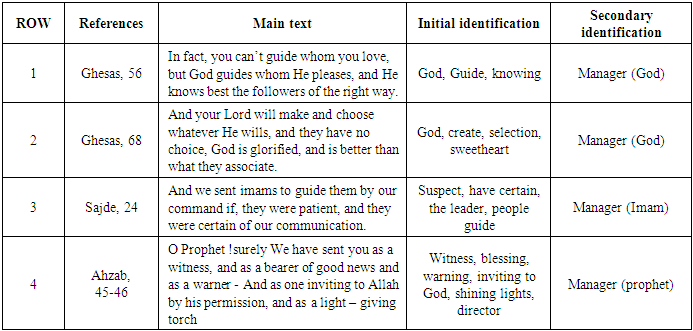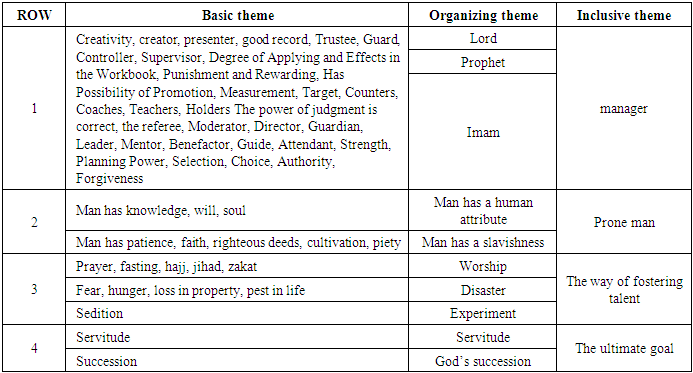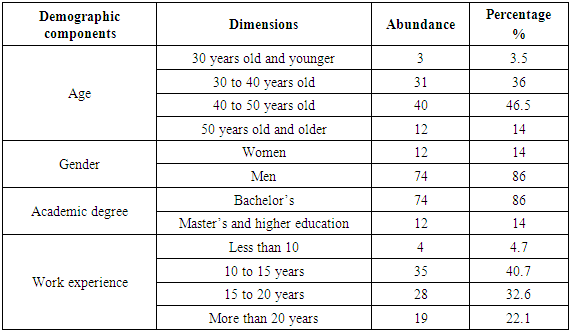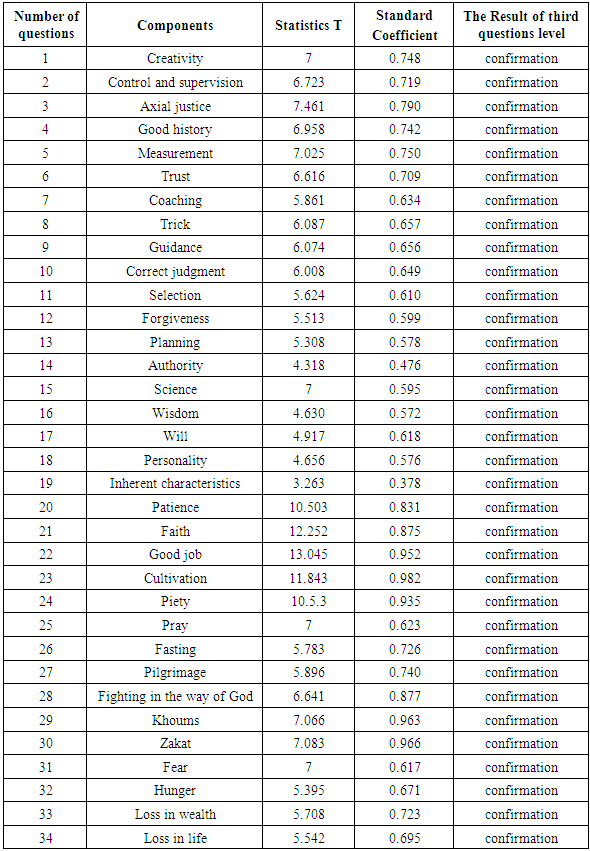-
Paper Information
- Paper Submission
-
Journal Information
- About This Journal
- Editorial Board
- Current Issue
- Archive
- Author Guidelines
- Contact Us
Human Resource Management Research
p-ISSN: 2169-9607 e-ISSN: 2169-9666
2018; 8(3): 49-62
doi:10.5923/j.hrmr.20180803.02

Talent Management Components from the Perspective of the Quran
Hamid Reza Qasemi, Fatemeh Akbari Farahani, Mahboubeh Ranjkesh Roodsari
Department of Public Administration, Islamic Azad University-Arak Branch, Arak, Iran
Correspondence to: Hamid Reza Qasemi, Department of Public Administration, Islamic Azad University-Arak Branch, Arak, Iran.
| Email: |  |
Copyright © 2018 The Author(s). Published by Scientific & Academic Publishing.
This work is licensed under the Creative Commons Attribution International License (CC BY).
http://creativecommons.org/licenses/by/4.0/

This research was conducted to identify and introduce the components of talent management from the point of view of the Quran. It is a combined method which is an applied objective that has been carried out in two stages: First stage identifies the components of talent management by content analysis of the Quran verses; Second step is to test resulted components in the form of a conceptual model in a government organization by a designed questionnaire. Statistical population of this research includes employees of the national distribution company of petroleum products in Markazi province. In this research two methods of content analysis and questionnaire were used to collect required data. Extracted model of subject literature was evaluated based on structural equation modeling using Amos software. Findings of the research showed that the identified components are in the form of a community-approved conceptual model.
Keywords: Talent management, Manager, Potential man, Cultivate talent, Quran
Cite this paper: Hamid Reza Qasemi, Fatemeh Akbari Farahani, Mahboubeh Ranjkesh Roodsari, Talent Management Components from the Perspective of the Quran, Human Resource Management Research, Vol. 8 No. 3, 2018, pp. 49-62. doi: 10.5923/j.hrmr.20180803.02.
Article Outline
1. Introduction
- According to Allport [1], self-knowledge means to know the difference between who you really are and you think you are. Therefore, some researchers believe that it is to be ensured that every employee works at superior level through talent management [2]. But researches have shown that there is lack of a theoretical development in the field of talent management [3-5]. Despite the general development of talent management for a decade, it is still ambiguous and unclear [6]. Hence, one of the five key challenges for human resources is talent management in Islamic World [7].The researcher seeks solution to this challenge, not by studying Western texts, but by the Holy Quran. Because the lord says in the Quran (The guidance of man is for us) [8]. One of the most important concepts of the view of Quran is (human being as the caliph of God on earth) and talent is one of the most valuable aspect of human that can be funded by various research. This research is intended to study the concept of talent management in the view of Quranic verses.Because the world of organizations is a challenging and agile world, so the increasing trend of competition and the need for organizations to achieve higher levels of quality and productivity that the future managers are far more capable and more prudent than today managers. On the other hand, numerous empirical researches have shown that despite the necessity of entering new management thoughts and ideas into successful organizations by identifying and developing in-house managerial talent, providing its future needs to deserve and effective managers [9]. Today, the topic of talent management is one of the important issues ‘that has been able to play an important role in organizations and among researchers in the field of management. On the other hand, the mere adherence to Western theories and manuscripts in the field of humanities and management cannot meet the needs of society.
2. Literature Review
- Organizations move by individuals; who leads to the successful of that organization; therefore, talent management is the core of it [10]. Talent management involves variety of approaches; Which together provide a set to a coherent whole and it is meant to develop and implement coordinated activities that organizations need in order to obtain and retain potential ones [11].Talent means preparation for work [12]. A potential person is one who is prepared to do something. From the point of view of the Qur'an, man is a creature that God has cherished and gave him talents, until they surpass many creatures [13]. According to some scholars, the noblest talent in man is to rise toward God: O man, you will suffer greatly in the way of the lord, and you will be rewarded for it [14].The view of the Qur'an is that man has all the perfections in power and has to act on them, and he should be constructive and architectural. The basic condition for human compliance is to believe in the potentialities, that it is faith. The faith causes piety, good action and diligence in the way of God. It is by faith that it comes out of the face of a malicious tool in the hands of the soul and becomes a useful tool [15].If man joins the only truth which faith in it and remembering it all the time, gives peace to him, then he will be the owner, he is the owner of all perfections, if they separate from that fact, they will be a tree that is separated from its root [16]. Man is through his wisdom and will that is his own And his personality becomes stronger. Ownership of self and self-control and escape from the attraction of affiliates is the main objective of Islamic education and the goal and purpose of such education is spiritual freedom [17].With this description, it seems that Islamic education can be synonymous with talent management. In the Qur’an, various concepts have been used as the director, including the words; (prophet), (messenger), and (Imam).Lord is said to be one who owns something and plays a role in its growth and breeding. God is the true owner of the universe, and the most prudent and lord of it. The image of all Being has an evolutionary movement, in the direction that God has determined and guided [18].Prophet (messenger): Who is revealed, they provide people with what he receives through revelation. The mission is revelation and propagation of the commandments of God and educating the people through awareness. Therefore, the messenger is the one who is required to strive in the field of his mission, Use any means to invite people to God and make a decree and work for a cultural, intellectual and ideological revolution.Imam: Imam is the one who, by forming the divine government and gaining the necessary powers, tries to practically execute God's commandments. And if he cannot form a government, he will try to enforce the judgments as much as he can to do [19].Management features from the perspective of the QuranBased on the studying and interpretation of the Holy Quran, there are management features such as: creativity, justice, the good history, lending, coaching, the guidance, the correct judgments, the ignorance of error, authority, planning, selection, control and supervision and measurement.- Creativity: Creativity is essential for the survival of any organization, for this reason, it is a good person to be able to come up with innovative designs and solutions to solve problems and improve the status quo with new situations and toilets [20]. In verse 20 of surah Taha, it is stated that man has all the talents necessary for creativity: “He said: our Lord is the one who gave to every living thing whatever was necessary for creation, and then he directed” [21].- Justice: the middle point and the limit of extremes, and one of the features that is most commonly used to select managers. One of the characteristics of an ideal human being in the Quran is Justice. Since there is justice in the human body, it is very much considered in the Qur'an and it is one of the attributes of believers. “O! You, Believers! Be maintainers of justice, bearers of witness of Allah’s sake” [22, 23]. “Surely God commands you to make over trusts to their owners and that when you judge between people you judge with justice; surely Allah admonishes you with what is excellent; surely Allah is seeing and hearing “[24, 20].- Good record: The Qur'an invites humans to have a good record and belief in God as the best story. “Did it surprise people to send a revelation to a man from amongst them, to scare people from the consequences of sin and disbelief? And giving glad tidings to those who believe, that they have a good record and rewarded with their Lord [25].- Coaching: God enlivens all Being and takes it all the best (God is the heavens and the earth, and all that is between them). The coach must have both strength and mercy. “God is invincible and generous” [26].- Trick: Creator is worthy of management and guidance. “Your God created the heavens and the earth in six days; then was guided by the world; He created the day with night, and the night follows the day, moving quickly, creating the sun and the moon and the stars that they are under command. Be aware that the creation and guidance of the world is from him, God, the Lord of the Worlds, is irrevocable” [27].- Guidance: Prophets are the means of guidance with the truth. They, their words, their actions, their practices and their promises are all right.” (Lord sends the prophets to the right.)” [28]. The Qur'an also introduces two kinds of guidance: One shows way, another to reach the destination and purpose. The first type is the work of the prophets “and we made them Imams who guided people by our command” [29]. But guidance is in the second sense of God's sake. “Certainly; you cannot guide whom you love, but guides whom He pleases” [30].- Selection: Choosing and appointing directors to lead an organization has a significant importance and you must choose the best from among the eligible ones, as according to verse 33 of Surah Al-Imran, the Lord has chosen them from all over the world for the appointment of the Prophets. “Surely Allah chose Adam and Nuh and the descendants of Ibrahim and the descendants of Imran above the nations. “- Forgiveness, sacrifice, and waiver of error: Forgiveness, sacrifice and ignorance of error are from the basic principles that Divine prophets never succeeded in fulfilling their mission without benefit. They did their great divine missions without fear of hardships and problems, as far as Allah says about the prophets: “that who deliver the messages of Allah and fear him, and do not fear anyone but Allah; and Allah is sufficient to take account” [31].- Planning: Planning means designing an operation to change an object or subject based on the predicted pattern, “He causes the dawn to break; and He has made the night for rest, and the sun and the moon for reckoning; This is an arrangement of the mighty, knowing” [32]. Careful planning and full implementation of the programs requires science and powerful, Science is to formulate plans and power to do well.- Control and monitoring: One of the tasks is to supervise staff and monitor work processes. The Qur'an identifies the supervision of individuals, including the monitoring of their appearance, their intents. He knows the stealthy looks and that witch the breasts conceal” [33].- Evaluation and Measurement: For his evaluation, the director considers the employee's suitability to be competent, and according to the Holy Qur'an, a worthy criterion of being competent, that is an action which is performed in the direction of human perfection, and did not create destruction in the culture of society. He won’t punish you if you do something wrong, but you will see the reflection in your own life. In the same way, He will do well to a man and a woman, if they are faithful. They will enter Paradise, and there will be an unbelievable access to it” [34].Human features from the perspective of the QuranIn terms of the Qur'an, man is a creature who has cherished God and gave him the talents to prevail over creatures [35]. Talent is unique for the human being, because the rest of the animals do not have this kind of brain ability and capacity. If we want to manage talent of human resources accordingly the Quran, it should be identify the features. The most important features of mankind are:- Man is God's successor on the earth: When Lord wished to create him, declares his will to the angels. They said, "Do you invent a creature that will ruin the earth and pour blood on." He said: I know something that you don’t know” [36]. “And He is the one who has made successors in the Land and raised some of you above others by (various) grades, that He might test you by what He has given to you” [37].- Human scientific capacity is the greatest capacity that a creature may have: “He taught all the names to Adam, (Familiar with all the truths), then he asked the angels: What are the names of these? They said: Glory is to thee! We have no knowledge but that which thou hast taught us; surely thou art the one who know the wise. God told Adam: O Adam! Inform them of their names. Then when he had informed them of their names, He said: Did I not say to you that I surely know what is secret in the heavens and the earth and I know what you manifest and what you hide? [38].- He is delighted with God, he is aware of his deep conscience: All denials and doubts, diseases and deviations are of the essence of mankind. “And when our Lord brought forth from the children of Adam, from their backs, their descendants, and made them bear witness against their own souls: Am I not your Lord? They said: Yes! We bear witness …” [39]. “Then turn thy face straight to the right religion before there come from Allah the day which cannot be averted; on that day, they shall become separated” [40].- Man is a combination of matter and meaning: There is also a divine element in the nature of man in addition to the material elements that exist in the earth and the plant and animal. Man is a combination of nature and beyond nature, matter and meaning of the body and soul.” Who made everything well, that He has created, and He began the creation of man from dust. Then He made his progeny of an extract, of water held in light estimation. Then He made him complete and breathed into him of His spirit…” [43]. Man has been selected and chosen: The creation of man has not been accidental, Man has been selected. “God chose Adam, and accepted his repentance and guided him” [44].- Man has an independent and free personality: He is an independent and free person; he is the trustee of God. He has a mission and responsibility, He has been asked to make land with his own work and initiative, and choose one of two ways of happiness and cruelty with his choice. “We gave our trust in the heavens and the earth and the mountains. All refused to accept it and they were afraid to accept it. But the man took the trust and accepted it; indeed he was a tyrant and ignorant” [45]. “We created humans in pairs, to test him, So We created him in a way to be able to hear and see. Surely, He has we guided him; He is either self-grateful or disbelievers” [46].- Man has an inherent dignity: God has given him superiority over many creatures. He feels his own self-realization that he understands this dignity and considers himself superior to the zeal and dowry and captivity and lust. “Verily, we dignified human, and we made them dominion in the desert and the sea, and we bestowed on many creatures” [47].- Man has a moral conscience: They understand the ugly and beautiful Divine commandment. “Oath to the human soul and its moderation, which inspired the impurities and purity” [48].- The human heart does not calm down with anything other than remembering God: The demands of man are infinite; it becomes tired and bored, whatever it comes to, unless it comes to God’s infinite nature. “Indeed, only by remembrance of God, the hearts are restored” [49]. “You are trying hard to reach God; you will see him eventually” [50].- The blessings of the earth have been created for mankind: “Verily, Allah has created for you what is in the earth” [51]. “What is in the heavens and the earth is placed under the control of man” [52]. So the right to legitimate use has all of these.- He created man to worship his God and accept his command: So it is the duty of man to obey God's command. “We didn’t create man and others, but to worship God” [53].- Man can’t find himself in any ways than to worship his God and to remember Him: If he forgets his God, he forgets himself and does not know who he is, what he does and where to go. “Do not be of them that they, one of those who forgot God and God took away their own selves” [54].- As soon as man dies, everything becomes evident to him: So the facts that are covered today are revealed. “Certainly you were heedless of it, but now we have removed from your veil, so you have an open sight today” [55].- It does not only work for material matters and does not just move on to the material hardships of life: He probably moves for very big goals. He may not have the slightest satisfaction of his own creative work. “O soul! That is at rest! Return to your Lord, We – pleased (with him), well – pleasing (Him)” [56]. “God has promised to the believing men and women with gardens, beneath which rivers flow, to abide in them, and goodly dwellings in gardens of perpetual abode; and best of all is Allah’s goodly pleasure; that is the garden achievement” [57]. According to the Qur'an, human is a chosen being from the Lord, his successor in the semi-hegemonic, semi-material, divine, familiar, free, God-bearing, and responsible for himself and the world, dominating nature, the earth and the heavens, knowing good and evil, And its existence starts from disability and they are looking for perfection, But he does not calm the memory of Allah. His scientific and practical capacity is unlimited. He has inherent dignity. His motives are not materialistic. His right to enjoy legitimate enjoyment of God's blessings has been given to him and he has duties in front of his God [58].The components of talent from the perspective of the QuranIn Quranic verses, there are different phrases and words that have semantic and conceptual connotations with talent and talent management. These words include Imam, Prophet, messenger, successor, order, degrees, magnanimity, essence, thought, responsibility, men, women, daughters, brothers, faith, patience, righteous right, gift, will, intellect, servant, and all derivatives. These components can be understood from some related studies [104].Also, in verses from the Qur'an, there are some examples that are likely to be related to talent and talent management. “And He is who has made successors in the Land and raised some of you above others by (various) grades,” [59].) And also, “He sends down water from the cloud, then water courses flow (with water) according to their measure,” [60]. That is, the mercy of the Lord deprives any susceptible person, but the talents and capacities of the beings are the same. Talents are different. Each container, as much as it can, is filled with God’s mercy [61].“Surely we have created man from a small life – germ uniting (itself): We mean to try him, so we created him in a way to be able to hear and see” [62]. The purpose is that there are many talents, the words of today, in his genes. For this reason, we exposed him to trial and reward and punishment [63]. “He guides whom He likes to the right path” [64]. As we know people have different levels of talent [65]. If someone has a talent superior, it is not a sign of spiritual virtue and Allah's coming. If he can make better use of this superior talent and works more honestly, he will be at a higher level of virtue and, therefore, will be closer to perfection [66]. As stated, components with the following definitions can be presented:Talent management: According to the theory of nature, Man possesses human talents and originally, which potentially exist, and must be nurtured. It means developing these talents and flourishing them, not building and re-establishing something in human existence [67, 68].Manager: Includes Lord, Prophet (Messenger) and Imam.Lord: Allah is the creator of all things, also the manager of their affairs of them [69]. Stick to owner is said to seek to preserve and regulate his property. The Throne is the center of God's command, apart from the seven heavens [70]. The Creator is worthy of guidance and managing and the Throne is the center of God's decision-making [71].Prophet: The messenger is the one who brought the Book and the prophet has brought messages from God or the messenger is the one who brings the messages from God and the Prophet performs them [72]. Prophets are the chosen ones of God [73]. God has given the Prophets the guidance of his servants [74]. Prophets guides people with right guidance, their own words, actions, practices and promises are all right [75].Imam: A teacher sent from God, the one who is trained by the Lord of Two worlds, who has been trained with God's knowledge and practice, and educates the people. In fact, the Prophet and Imam are also tasked with educating the people as the Lord.Prerequisite man: It has two human characteristics and slavery. Human being with characteristics means He has knowledge, will and soul; and the servant of God, that is, one who has patience, piety, cultivation, faith, and righteous deeds.Science: In the culture of the Qur'an, science and ignorance have a broader meaning than knowing or not. The scientist is the one who has thought and practice on the truth, although he does not have the power to read and write, and the ignorant is the one who is thinking and acting and vice versa, although he knows all the sciences. The scientist is the ones who are exposed to disbelief and polytheism, that is, the true science of human beings and faith in God [76]. Science is the culmination of human’s progress, “… O My God! Teach me more” [77, 78].Wisdom: The word wisdom has come down to the Qur’an several times and is expressed with perfection each time, such as:1- Understand the secrets of the rules. “And there is life for you in (the law of) retaliation, O men of understanding, that you may guard yourselves” [79].2- They are prospective,” … And make provision, for surely the provision is the guarding of oneself, and be careful (of your duty) to me, O men of understanding” [80].3- They know the world as a transit point, not a stopwatch.” Those who remember Allah standing and sitting and lying on their sides and reflect on the creation of the heavens and the earth: Our Lord! Thou hast not created this in vain! Glory is to thee; save us then from the chastisement of the fire” [81].4- From history, they learn the lesson. “In their histories there is certainly a lesson for men of understanding…” [82].5- They accept the best and the most logical points. “Those who listen to the word, then follow the best of it; those are they whom Allah has guided, and those it is who are the men of understanding” [83].6- They are tributaries and worshipers. “What! The one, who is obedient during hours of the night, prostrating himself and standing, takes care of the hereafter and hopes for the mercy of his Lord! Say: Are those who know and those who do not know alike? Only the men of understanding are mindful [84, 85]. Will: The will is the coherence of reason. Wherever is wisdom, there is the will, where there is no wisdom there is no will. Man can move upward, but sometimes it is not upright, moving is a jerk. The tendency of man to stretch towards an external object, but the will is inward to the outside, that is, not a relationship between man and the outside world. But on the contrary, after thinking about things, he looks at the end of the work and measures it. If it is expedient, he does in the real world, not with desire. The will is to control all the sensual passions and hatreds and fears [86]. Personality: Personality means the human structure and mental structure of man, which is inherent in mankind and social culture for man [87]. Nature: Nature is the traits and characteristics that are necessary for the creation of mankind, and from the beginning of creation in the human body or it means the original nature, That is, the set of forces and talents that have been placed in human existence [88]. Patience: Patience does not just mean to endure problems, but also includes perseverance in worship, confrontation with sin, tolerance in disaster, decision in obedience, and lack of pride and drunkenness in blessings [89]. Piety: Piety does not just mean avoiding evil, but it also means taking care of good things.The almighty is not the one who does not commit any sins, but whoever becomes slipping seriously repents and has a pure heart and soul [90].Purification: It means growth and purification [91].Faith: Belief and good deeds have a degree and are low or high [92]. “… So they should answer my call and believe in me that they may walk in the right way” [93]. Like the heavenly books, that is a means of healing. Real believers are also grown up. “These are the followers of a right way” [94]. The growth in the Qur'an is meant to be spiritual growth, and this is the narrow mind that human beings only know the prosperity of the world [95].Talent Training: A variety of talent training includes three types: worship, tribulation, and experiment.Worship: There are two plans for human happiness, and salvation is in both types of action: a) routine programs such as: Bowing, Procrastination, and Other Worship, b) Variable programs that depend on time and space, which have a special purpose at any time. Salvation is the last stage of evolution, which should be expected after doing worship and doing good.Disaster: Disasters cause, Resistance and Growth, and many human traits such as: patience, satisfaction, submission, courtesy, asceticism, piety, solace and self-sacrifice in dealing with imperfections. The disasters that are on his side are seized by the true owner and the Lord in his plots, If a person knows that God is wise and merciful, and that he is also a servant who has never been before, “… We created him before, when he was nothing” [96]. Even after some steps, nothing has been mentioned. “When he was a thing not worth mentioning” [97]. He will accept that he must be in the hands of God.Experience (Test): To experience is sometimes a way to test people to discover to trust. And sometimes it means creating different backgrounds for internal situations [98]. In the Qur'an, the issue of testing and examinations is about 20 times, and is a divine tradition [99]. God does not test us to add his knowledge, as he knows everything before us, because he knows everything beforehand, these experiments are for the emergence of the hidden talents and the efforts and actions of human beings. If they do not do anything, they will not be entitled to reward. Bugs and life sweets are all test tools. Sometimes people are tested with conditions and calamities, and others are tested with prosperity and inevitably all people, even prophets. These tests and experiences are for the growth of people.Purpose of Talent Management: Purpose of Talent Management includes two types: God's worship and successionServitude: What constitutes the election of man to God is servitude [100]. Serving God is the condition of the arrival of the Prophets as the mission [101].God's successor: In terms of Tabaresi, the successor tells someone that he undertakes the task of someone else, and, God's successor on earth, tells someone; God has given him the decree of his servants to his command. However, the principle of the meaning of succession is something else [102].Therefore, research questions can be expressed in three levels as follows:First level Question: What are the components of talent management from the point of view of the Quran?Second level questions: Do God, Prophet, and Imam have human characteristics, attributes of slavery, worship, submissiveness, servitude, God's succession; are components of talent management from the point of view of the Quran?Third level questions: Is creativity, control, supervision, pivotal justice, good history, measurement, trust, coaching, guidance, correct judgment, greediness, forgiveness, planning, authority, reason, will, science, virtue, patience, Belief, righteous deeds, prayer, fasting, struggle, fear, hunger, decline in life, loss in wealth, are components of talent in management from the point of view of the Quran?Conceptual model: First, based on the studies carried out in the field of religious literature, each component of talent management from the perspective of the Qur'an was identified based on the contents of the religious and religious books based on the same scientific sources of Islam. These include: Manager Components, Prerequisite Man, Talent Training and Talent Management Purpose. On the same basis, the following was considered for each of these components. For the component of the director: The variables of the Lord, the Prophet, Imam, the predisposing human component, the variables: A predisposing man with a human attribute and a predisposing human being, the attribute of servitude, a component of the ability to cultivate talent, as well as three variables, worship, passion and experiment, and ultimately the goal of management of talent, variables: servitude and succession of God, was determined. Similarly, indicators were considered for variables. The variables of the Lord, the Prophet and Imam include indicators; creativity, good history, control, and monitoring, planning, authority, selection, reformation, coaching, guidance, measurement, justice, judiciary and trustworthiness. Independent human variable has human characteristics, including five indicators: wisdom, will, faculty, science, soul; and variable A predisposing human being possesses the attributes of bondage, including five attributes: piety, cultivation, patience, faith, and righteous action.The variable of worship consists of six indicators: prayer, fasting, pilgrimage, struggle, khoums, zakat and disaster variable including four indicators: fear, hunger, fall in life, and loss in wealth.Since this research is a comparative current, that is, from the whole to the details. This research has been conducted for the first time in the country based on a three-level theoretical framework and its purpose is to introduce a talent management model based on Quranic components to government agencies. Therefore, according to the research literature, the conceptual model of the research is in the form of one.
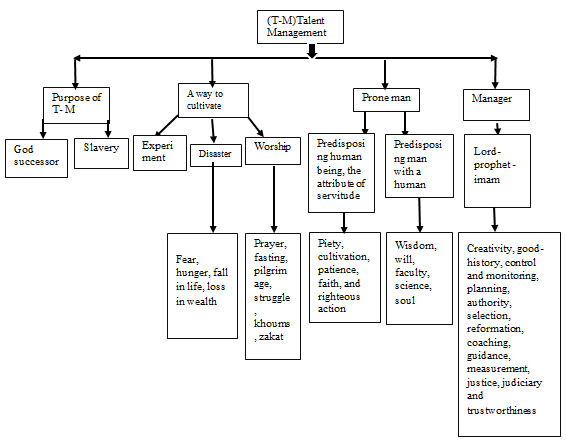 | Figure 1. Conceptual model of the research |
3. Research Methodology
- This research is combined and purposeful and is implemented in two stages:Stage One: To identify the components of talent management from the perspective of the Quran. In order to perform the first stage, using the content analysis, the research was carried out in the form of a library. Using the text of the Qur'an (Alanvar software), words and phrases were extracted from the point of view of interpretive science related to one of the concepts, (human), (talent) and (management). The initial information was collected using the Quranic Software and analyzed by content analysis and categorization and coding.Stage Two: The verification of components, in the form of a conceptual model, in a government organization. The extracted words and phrases were based on the design of a questionnaire and distributed and collected in a survey. In order to collect information in this stage, the questionnaire, based on the Likert scale, is prepared and arranged and consists 37 questions.The Likert scaling is one of the measurement methods that uses the standardized response categories, such as "Absolutely Agree.", "Agree", "disagree", “Completely, disagree." In this research for data analysis, content analysis method was used to extract the components from the Qur'an, and then the questionnaire was used using the (SPSS) and (AMOS) software [103].In this research, for analyzing information: content analysis method was used to extract the components from the Quran, and to analyze the response of the questionnaires (SPSS) and (AMOS) software were used.Confirmatory factor analysis method is used for evaluation and modeling of structural equations using (AMOS) software.In brief, the research methodology is set in two stages and including following process:a) the research has three level questions (first level, second level, third level)b) driving components of talent management from the Quran verses by content analysisc) providing a conceptual model in a three level model for talent management based on above stepd) the verification of components, in the form of a conceptual model, in a government organization by a designed questionnairee) the questionnaire has Likert scale and is designedf) analysis data by AMOS
4. Research Findings
- Stage One: Content Analysis FindingsThis method has been implemented in three phases and six steps. In the first stage, by extracting the themes related to the Quran, the primary and secondary identifiers were identified, then the analysis and drawing of the network were made and finally the composition and integration of the text was reported. Tables 1 to 8 give examples of these themes.
|
|
|
|
|
|
|
|
|
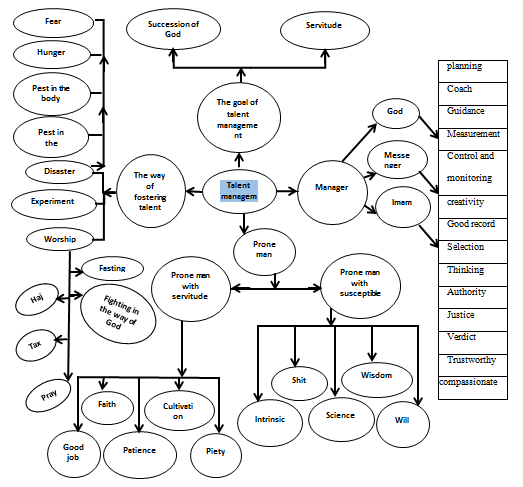 | Figure 2. Themes Network |
4.1. Verification of the Components
- After the content analysis process, verification of the components was done in the form of the model, through the adjustment and distribution of the questionnaire, among the employees of the Markazi Oil National Distribution Company. The demographic results from the questionnaire are described in Table 10.
|
|
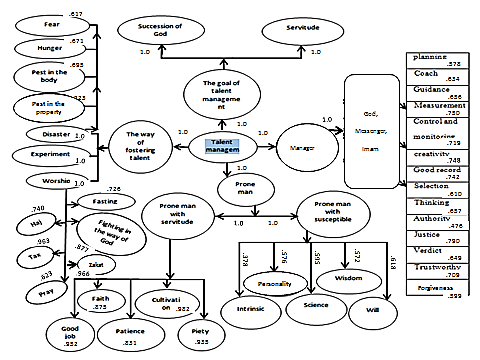 | Figure 3. Model of standard coefficient for talent management components from Qur’anic perspective (AMOS Output) |
5. Conclusions and Suggestion
- According to the words of Imam Ali (AS), the Qur'an is a sea that nobody reaches to the depths of it, so it is very important to pay attention to it, and everyone in any field will be able to study it. Therefore, it is encouraged by the authorities, in this regard; universities can plan and implement various programs.According to the Qur'anic material, it is necessary that from one side, the professors of this field and university in different fields, especially in the management, establish a deeper relationship with each other and share knowledge, and further study the subject of the research, and on the other hand to encourage the students to research more about them.It is suggested that future researchers investigate whether there are other components in talent management or not?What are management indicators? What components can be identified in comparison with other religious books such as Nahj-ol-Balaghah and other celestial books such as the Torah and the Gospel?
 Abstract
Abstract Reference
Reference Full-Text PDF
Full-Text PDF Full-text HTML
Full-text HTML